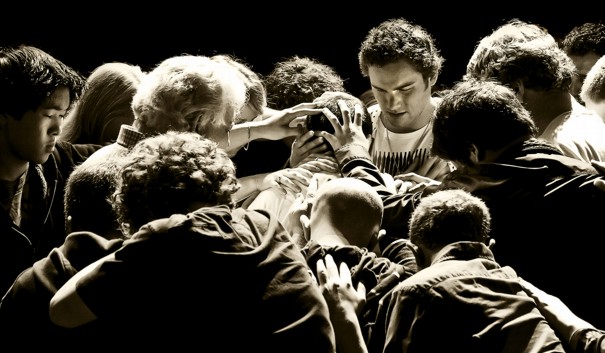Philippians 2
Within many men is the desire to be a protector and provider. You can see this in their thoughts and decisions. They want to ensure every need is met and every heart is full. Every need. Every heart.
But what happens when the hero tries to save everyone? What becomes of the hero’s primary mission?
We live in a time where people are selfish. Like Paul describing the last days to Timothy, his message resonates with us today:
2 Timothy 3:1-5 – This know also, that in the last days perilous times shall come. For men shall be lovers of their own selves, covetous, boasters, proud, blasphemers, disobedient to parents, unthankful, unholy, Without natural affection, trucebreakers, false accusers, incontinent, fierce, despisers of those that are good, Traitors, heady, highminded, lovers of pleasures more than lovers of God; Having a form of godliness, but denying the power thereof: from such turn away.
When we read these scriptures in 2 Timothy, self is an underlying theme. In many ways, we see selfish acts on a daily basis, where actions and motives are based on what a person can receive or take from another person and not what they give.
In Matthew 14:22-33, Jesus sent His disciples away in a ship while he sent the multitudes of people following them away. While the disciples were on the seas, they were tossed with waves and a strong wind. Early in the morning, Jesus walked on the sea toward the ship. When the disciples saw Him on walking on the seas, they were afraid, but He told them who He was and not to be afraid. Peter cried out to Him and said, “Lord, if it be thou, bid me come unto thee on the water.”
Jesus said “come,” and Peter walked on the water toward Jesus.
1. Trust is a journey between two rivers of life. When God desires us to trust Him, we know it will stretch our mind, will, and capacity of our current standing. It will cause us to give up our desire to control people or a situation and move into the ‘unknown.’ What is unknown is not what God said, but how things will end up for us.
Matthew 20:25-28 – But Jesus called them [unto him], and said, Ye know that the princes of the Gentiles exercise dominion over them, and they that are great exercise authority upon them. But it shall not be so among you: but whosoever will be great among you, let him be your minister; And whosoever will be chief among you, let him be your servant: Even as the Son of man came not to be ministered unto, but to minister, and to give his life a ransom for many.
In reading Matthew 20, after Jesus explains how the last will be first and the first last (in comparison to servanthood), the mother of Zebedee’s children comes to Him and asks a question. She asks for her sons to be given the right to sit on the left and right of Jesus in His kingdom. He tells her that those places will be given to those whom the Father has already prepared. (This is a paraphrase.) Now, based upon Jesus’ response to James’ and John’s mother (Mark 1:19), her reasoning for placing them to the right and left of Him was for them to be in positions of authority over people in His kingdom. Jesus then brought His disciples together and told them that they were not to exercise dominion over people. He gave the example of the princes of the Gentiles and those over them (the great)…and how they exercise authority over the people and one another. The disciples were not to live over people in such a manner. The great and chief among the people must be a minister and servant among them.
Exodus 17:8-16 – Then came Amalek, and fought with Israel in Rephidim. And Moses said unto Joshua, Choose us out men, and go out, fight with Amalek: to morrow I will stand on the top of the hill with the rod of God in mine hand. So Joshua did as Moses had said to him, and fought with Amalek: and Moses, Aaron, and Hur went up to the top of the hill. And it came to pass, when Moses held up his hand, that Israel prevailed: and when he let down his hand, Amalek prevailed. But Moses hands were heavy; and they took a stone, and put it under him, and he sat thereon; and Aaron and Hur stayed up his hands, the one on the one side, and the other on the other side; and his hands were steady until the going down of the sun. And Joshua discomfited Amalek and his people with the edge of the sword. And the LORD said unto Moses, Write this for a memorial in a book, and rehearse it in the ears of Joshua: for I will utterly put out the remembrance of Amalek from under heaven. And Moses built an altar, and called the name of it Jehovahnissi: For he said, Because the LORD hath sworn that the LORD will have war with Amalek from generation to generation.
When Amalek came against Israel, Moses sent Joshua to go out to fight against Amalek. Moses would stand over the fighting with the rod of God in his hand. Aaron and Hur also accompanied him.
It came to pass that as Moses’ hands were lifted up, the Israelites prevailed, but when his hands fell, Amalek prevailed. What an interesting sight to see the fighting between the two as Moses’ hands lifted and fell. Aaron and Hur found a stone and placed it under Moses and they kept his hands up until the sun set until Joshua discomfited (vanquished, weakened) Amalek.
Though the circumstances surrounding Israel’s battle with Amalek may not be applicable to every situation in our lives, there are some lasting principles that can be drawn from it for those that follow any leader:
Why do I always have to go through trials and temptation? I don’t want to continue facing the same things over and over and over AND OVER again! I just want to be free.
Have you ever felt like that? Have you ever felt like the Apostle Paul when he said that when he wants to do right, sin is right there (Romans 7:21)? OR the things you want to do you don’t do, but the things you don’t want to do, THAT you find yourself doing (Romans 7:15)? Many of us can relate to Paul’s statements of temptation and sin, but we often stop there without going any further. We continue to live in a cycle that goes from temptation-sin-repentance-temptation-sin-repentance and it never seems to stop. We want to get off the merry-go-round, but it doesn’t seem like we ever can. Why do I have to go through this? Why can’t God just take it away because He knows I want to serve Him. If I didn’t have this ‘sin’ issue, I could just run for Him.
Matthew 5:9 (KJV) – Blessed are the peacemakers: for they shall be called children of God.
Have you ever tried to restore a relationship between two people (or groups) and things got worse? Even though you had the best intentions and wanted a peaceful resolution, the outcome was FAR from perfect. You want people to get along and enjoy a peaceful co-existence (and even get along), but the two ‘sides’ don’t seem to want peace. What do you do?!
1. You can’t make them drink. Most of us have heard the saying, ‘you can take a horse to water but you can’t make him drink.’ With relationships, you can bring people together, but you can’t make them get along. Even if you have the best of intentions, bringing these sides together may not bring the peace or outcome you desire.
…don’t try it unless it is God-directed…
2. Understand that each person/group may never come to ‘terms’ with one another. For whatever reason, neither side will move toward a compromise or any other form of reconciliation. Each side holds to their ‘terms,’ unwilling to negotiate. Years and decades can go by and both sides are comfortable with not speaking to one another.
Even if the situation pains you, you must understand that you can’t make them drink…
3. Make peace with each person. When the sides are unwilling to reconcile, you can do your part in building a healthy relationship with each side. Each person has a different (and specific) path toward peace to follow. Therefore, it will be important for you to think of the person’s needs above your own (Philippians 2:4) and build from there.
Now, there may be situations where you are ‘clumped’ with the one of the sides and other side isn’t speaking with you. If this is the case, remember, you can’t make them drink. You can try to reach out to them through letters, phone calls, etc. (no overburdening or stalking), but it must be within GodÂ’s timing and method.
4. Learn to live with the reality of the current circumstances. The situation may not seem pleasant and go against everything you desire to see, but you must find peace in the way things are. This is not to say you don’t want peace or don’t care about the people involved, but if they don’t want peace, you involvement to bring them together may make things worse.
Each person has their own reasons for division. Each dynamic is different and will require your patience, understanding, and love.
5. Don’t become emotionally charged. When you allow your emotions to get the best of you, you may make decisions that bring additional pain, strife, and division.
Proverbs 4:26 – Ponder the path of thy feet, and let all thy ways be established.
Colossians 3:15 – And let the peace of God rule in your hearts, to the which also ye are called in one body; and be thankful.
6. Pray (this should be first and continuous throughout your situations). In the context of relationships, there are many dynamics to being a peacemaker. Some situations seem so daunting, painful, and complex that you don’t know where to begin (or end). Pray to God about the best course of action to take. Sometimes we want to jump into action to do something (for the sake of doing something), but maybe the best thing to do is to pray (and be still). We may not have all the answers, but we know Someone that does. Let’s go to Him and ask for His help.
Don’t allow the strain of relationships deter you from being a peacemaker. You cannot control the decisions of others, but you can control your own actions. Don’t let go of your dream of reconciliation and peace!
Photo courtesy of freeimages.com/Davide Guglielmo
Attending seminary is a tremendous experience and blessing to ministers of the gospel. As students traverse their way through academia, there are a few pointers for their travels:
1. Be open minded. In the seminary setting, you have an opportunity to engage in conversations with people that may not be of your same race, cultural background, tradition, or affiliation. You have an opportunity to see Christianity from a different perspective. You may not agree with everything you see, hear, or read, but you don’t have to become controversial or argumentative (Proverbs 15:1, 28; Philippians 2:14-16). Voice your opinion, back it up with scripture (if applicable), and invite comments and questions. Be approachable.
Follow Us
Search the site
Disclaimer
Privacy Policy
Terms and Conditions
Website Information








